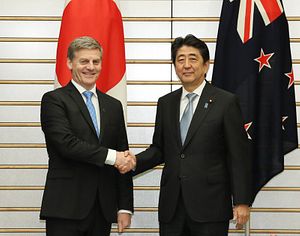China pushed back on a recent statement by Japan and New Zealand on the South China Sea. Released after Japanese Prime Minister Shinzo Abe’s meeting with his New Zealand counterpart Bill English during a bilateral visit last week, the statement called on all parties in the South China Sea disputes to resolve their disputes in line with the July 2016 ruling by a five-judge tribunal in a case filed by the Philippines against China in 2013. China rejected the validity of that ruling, which found its capacious so-called nine-dash line claim to the South China Sea invalid under international law.
“With joint efforts by involved parties, including China, the South China Sea situation has stabilized and improved,” Chinese Foreign Ministry spokesperson Hua Chunying noted in a statement. “We have to ask, what does Japan truly care about? Is it concerned about the stability of the South China Sea, or is it afraid of China-Philippines and China-ASEAN relations developing as the situation stabilizes,” Hua added.
“We hope countries outside the region will correctly comprehend the situation, treat the South China Sea issue objectively and rationally, not allow themselves to be taken advantage by other countries, and contribute to regional peace and stability,” she added.
China has repeatedly rejected any role for non-regional countries in the resolution of the disputes in the South China Sea, but has been especially sensitive to any initiative taken in the area by Japan. In August 2016, reports noted that China’s envoy in Tokyo had conveyed a “red line” to Japan, saying that China would not tolerate any Japanese participation in U.S.-led freedom of navigation operations (FONOPs). In September 2016, speaking in Washington, D.C., Japanese Defense Minister Tomomi Inada highlighted that Japan would increase its involvement in the South China Sea, but would not participate in bilateral patrols with the United States.
New Zealand, meanwhile, has made no change in its position on the South China Sea with Bill English’s latest meeting with Shinzo Abe. Last year, after the arbitral tribunal’s ruling was released, Wellington released a statement calling “on all parties to respect the Arbitral Tribunal ruling on maritime rights in the South China Sea.” “While New Zealand does not take a position on the various territorial claims in the South China Sea we have consistently stated that the differing interests in the region should be managed peacefully and in accordance with international law,” New Zealand then-Foreign Minister Murray McCully noted at the time.
In addition to China and the Philippines, Vietnam, Malaysia, Brunei, and Taiwan all claim various features in the South China Sea. Indonesia disputes part of its exclusive economic zone with China, but is not a claimant to any disputed features. The United States, which has also supported the 2016 arbitral tribunal ruling, does not take any position on the sovereignty of individual features.
































